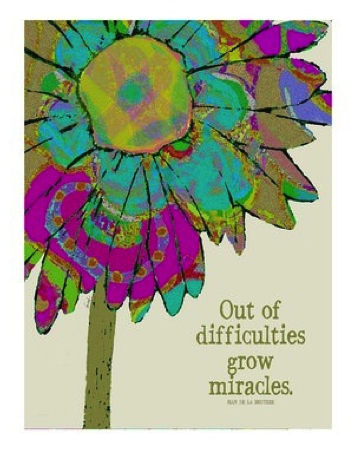Spotlight on Vitamin D
Wednesday, March 26, 2014
“Your body is the sum of the lifestyle choices that you make”

The body can achieve its most fertile state when all the nutrient and energy producing processes are optimal. This means that when we provide the body with the nutrients and water that it needs to maintain the optimal function of the brain, heart and other organs and systems that are vital to sustaining life, it will be in balance and reproductive health is more likely to be supported. But if our diet is deficient of essential nutrients, the few nutrients that we do absorb will primarily be used up in these vital processes and there may not be sufficient nutrients to support reproductive health. In addition, if we adopt negative lifestyle behaviors, such as drinking alcohol, high stress, consuming a diet high in sugar, refined carbohydrates, caffeine, additives and preservatives, exercising excessively, the bi-products of these behaviors require additional valuable nutrients to process, support or metabolize and the result will be nutrient deficiency. Today we can consider ourselves overfed but undernourished.

However, if we aim to follow an optimal diet and lifestyle plan to support mind and body wellbeing, we can help to ensure, as much as possible, the health of the egg, sperm, uterine environment and hormone balance. For optimal fertility we are aiming for:
- The presence of all the factors required for fertility and the creation of a healthy fetus.
- Nutrients, water and other co-factors to build cells, manufacture hormones and act as triggers for enzyme reactions.
- Adequate sleep, exercise and relaxation for hormone regulation, cellular repair and immunity.
- The absence of all the factors that are detrimental for fertility and the formation of a healthy fetus.
- Environmental toxins, food additives and preservatives, emotional stress, caffeine, alcohol, smoking, excessive exercise.
Spotlight on vitamin D & fertility
Vitamin D is a hormone that we make in our skin during sunscreen-free sun exposure; 80-90% is obtained this way. It is well-known for its function in maintaining calcium and phosphorus balance and promoting bone mineralization. But there is increasing evidence to suggest that vitamin D deficiency is linked to an increased risk for cancer, autoimmune disease, diabetes and cardiovascular diseases. There is also evidence that vitamin D modulates reproductive processes and has a significant role to play in both male and female fertility.
While there is limited direct research linking vitamin D to infertility, a study conducted involving 84 infertile women having IVF treatment, revealed that the women with higher levels of active vitamin D (25(OH)D) in their blood and follicular fluid, were significantly more likely to achieve clinical pregnancy following treatment.
Vitamin D may help boost levels of the female sex hormones progesterone and estrogen and thereby regulate menstrual cycle. It plays an important role in estrogen activity in the ovary, in the endometrial lining and the pituitary gland.
There is some evidence suggesting that vitamin D deficiency might be involved in insulin regulation, metabolic syndrome and in PCOS.
Vitamin D deficiency is linked to low sperm count and poor motility and is essential for the healthy development of a sperm’s nucleus. It also increases levels of the male sex hormone testosterone.
Variables affecting skin manufacture
- Skin Color (pale skin needs less exposure than darker skin)
- Where you live (in the UAE we are at a latitude that allows for D synthesis all year round)
- How much skin you expose (the back will manufacture more than only face and forearms)
- What time of day you are outside
- Sunscreen will prevent synthesis (Sunscreen blocks 95% of UVB rays)
How to obtain optimal levels of vitamin D
As humans we evolved near the equator and spent most our time outside and naked. Our modern lifestyle means we spend most of our time inside and fully clothed and as a result our vitamin D synthesis suffers.
- Daily sun exposure – Primary source
- Expose your skin without sunscreen for 50% of the time it takes to turn pink.
- During the time of day when your shadow is shorter than your height (i.e 10am – 2pm).
- Supplementation – a vital source in today’s modern lifestyle.
- On days you cannot go outside, take vitamin D supplements
- Ask the clinic for advice on dosage
- Dietary intake – “it is not possible to obtain sufficient vitamin D from diet alone.”
- Oily fish, liver, cheese, egg yolk.
You are more likely to become deficient if you are:
- Overweight, pregnant or elderly
- You are inside or covered or wearing sunscreen most of the time
- Indoors, where UVB does not penetrate glass windows
Having a blood test to measure the amount of vitamin D in your blood is the only way to know if you’re getting enough vitamin D. The blood test, 25(OH)D, is available at Fakih IVF.









